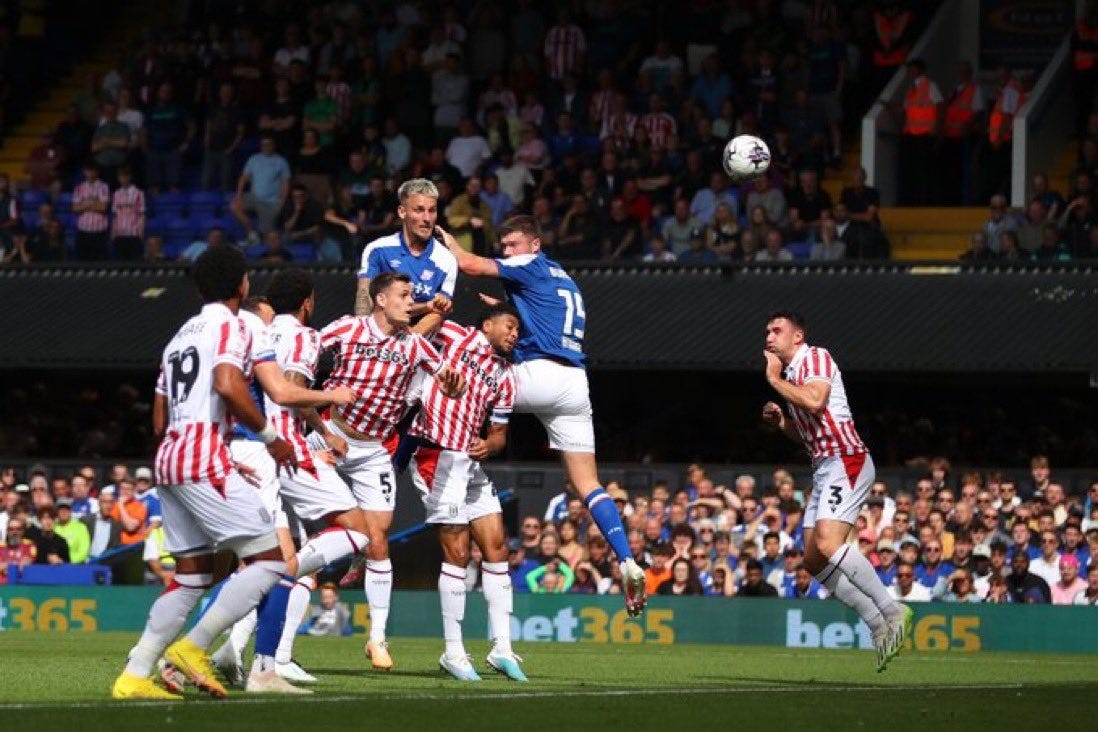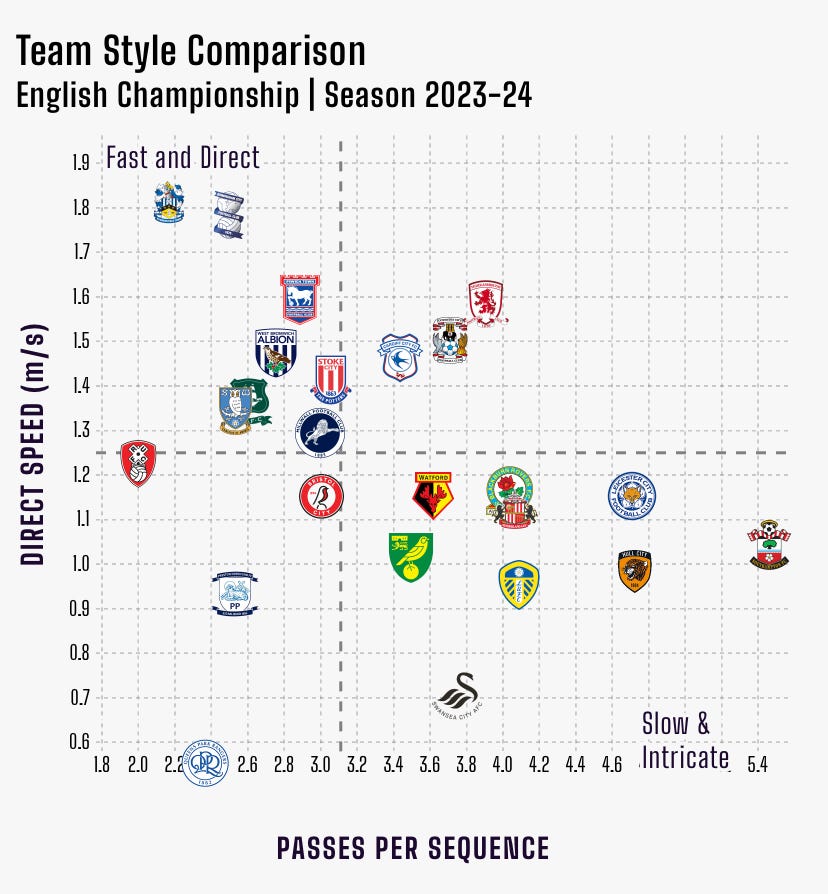How Ipswich Town have adapted to life back in the Championship
The Blues' smooth readjustment to second tier football is the culmination of smart thinking on and off the pitch
14th February 2023 was not a pleasant day for Ipswich Town supporters. Those who had the misfortunate of witnessing their team’s drab 0-0 stalemate at Bristol Rovers saw little to be encouraged by. The Blues had looked tired and out of ideas; the slump which had seen them record just four victories out of fourteen didn’t look like it was about to end anytime soon.
As fans trudged home, frantically trying to work out how to explain to their partners that postponing their Valentines Day plans had definitely been a good idea, and do so with a straight face, the league table made for depressing reading. Town’s failure to win had seen them slip out of the top three for the first time since August, eight points behind Plymouth Argyle and trailing Sheffield Wednesday by ten. For a fanbase starved of success for two decades, the prospect of a fifth consecutive campaign in League One was too much to contemplate.
Fast forward six months and Town, having romped to automatic promotion, now sit top of the Championship. Their unbeaten run currently stands at a remarkable 22 matches in all competitions, a record which is among the best in Europe.
That night in Bristol was the first time Kieran McKenna’s tactics were seriously questioned. The manager’s arrival in December 2021 had heralded an immediate upturn in results and performance levels. Where his predecessor Paul Cook had favoured a ‘put 11 players on the pitch and hope for the best’ approach, the ex-Manchester United coach brought innovative methods and established a clear identity. Defenders were encouraged to drive forwards, attacking patterns were easy on the eye and the players were clearly enjoying their football. Although it wasn’t enough to make up the ground in that season’s playoff race, the progress was clear and it was little surprise to see McKenna’s men sitting pretty in the automatic promotion places at the beginning of the following campaign.
Even during their downturn in the early weeks of 2023, Ipswich were still dominating games but while they still enjoyed the lion’s share of possession, the threat they posed was far less impressive. In short, the gameplan was becoming predictable. Opponents were happy to sit deep and soak up pressure, very few Town players were having any joy running at defenders and although the shot count was still high, a combination of poor finishing and a drop in quality of the chances being created had stifled their early season attacking threat.
In his post-match interview, a downtrodden McKenna vowed he would “keep working to find solutions” and tweak his blueprint. The results of his tactical rethink surpassed probably what even he thought possible and the final 15 matches saw 13 games won and 45 goals scored. Only a disappointing final day draw at Fleetwood prevented the 100-point barrier being broken
Not only had the Blues found a way to break down the division’s weaker sides, but their previously patchy record against fellow promotion contenders became a thing of the past too, with victories and clean sheets achieved on their travels to Bolton, Derby, Peterborough and Barnsley.
Just as impressive as the wins themselves was the manner in which they were achieved. Town enjoyed less than 50% of possession jn these four encounters and had to weather uncomfortable storms in all of them. The positional discipline shown by the players was outstanding, particularly in wide areas where blue shirts were happy to be patient and wait for opportunities before pouncing on any sign of weakness in their opponents. When they got the ball, they weren’t afraid to go more direct either.
George Hirst’s opening goal at Bolton was an example of this change in approach. With the home side keeping possession well in the first half, wideman Wes Burns’ usual forays forward had been few and far between but on 37 minutes he seized his chance. The Welshman capitalised on a loose pass by Wanderers defender Luke Mbete on the edge of the Town box and charged fifty yards up the pitch, before picking out the number 27, whose clever finish found the net.
Against Derby, the Blues dominated the early stages but the breakthrough came via a masterclass in counter attacking. On 11 minutes, goalkeeper Christian Walton plucked an in-swinging corner out of the air in his six-yard box and just five touches and fourteen seconds later, Conor Chaplin had fired Town in front. Another impressive move on the break put the game to bed, with the combination of Burns’ pace and Hirst’s clinical edge coming to the fore for a second time.
Off the field, the wheels for the mid-season revival had been set in motion a month before that cold evening at the Memorial Stadium. Despite Town heading into the January window in the top two and with the most expensively assembled squad in the division, CEO Mark Ashton proclaimed that he would “leave no stone unturned” in the transfer market. Seven-figure fees were spent on wide forward Nathan Broadhead and athletic full-back Harry Clarke. Meanwhile, long-time target Hirst was borrowed from Leicester City to bolster McKenna’s options up front and Massimo Luongo came in on a free in midfield, where talented academy graduate Cameron Humphreys had begun to struggle with the burden of playing every week at just 19 years-old.
The new signings took a few weeks to bed in (a process which has become a common theme since McKenna took over) but all four eventually became regular starters and once they did, Town finally had a settled first XI.
In no area of the pitch was this continuity better reflected than in the defence. From the moment George Byers put Sheffield Wednesday 2-0 up at Portman Road, three days before the Valentines debacle, it took until 10th April - two months and ten matches later - for the Town rearguard to be breached again. Cameron Burgess made the left-sided centre-back position his own and Harry Clarke cemented his place at right-back. The fact that the performances of both players, and the defence as a unit, significantly improved thereafter was not a coincidence.
Those who made way were fully on board too. Janoi Donacien had performed well up to that point and could have felt aggrieved at losing his place to Clarke. However, the fact that he instead decided to knuckle down and contribute when called upon, was a positive demonstration both of his character and McKenna’s man-management. Similarly, youngster Humphreys, who had been omitted from the matchday squad altogether for the promotion-sealing 6-0 drubbing of Exeter City, seemed just as jubilant as the rest of his teammates during the celebrations afterwards.
These radical changes made in the opening months of 2023 have been the key drivers of Town’s positive start to life back in the second tier. All eleven of the players who have started the first three league matches were at the club last season and are well-versed in the manager’s demands, yet with four of them having joined the club since the new year, things don’t feel stale either. The squad has the perfect blend of continuity and freshness.
This was evident when Stoke City came to Portman Road in the second week of the season. The Potters have been heavily backed this summer and arrived with confidence but their team, which contained six new additions, visibly lacked cohesion. By contrast, McKenna’s men were well-drilled and ran out comfortable 2-0 winners, putting together a slick passing move to finish the game off in the 83rd minute.
The opening day victory at last season’s playoff semi-finalists Sunderland, while less dominant, was even more eye-catching. After seeming overawed by the occasion during the opening 20 minutes, Town settled into the game and despite having very little possession, restricted the Black Cats to just a few clear-cut chances. Once again, the Blues were direct and dangerous on the break, with Leif Davis intermittently charging out of the defensive line to exploit the gaps left by Sunderland and launch attacks, creating opportunities and forcing a second yellow card for home full-back Trai Hume. Town had to survive a late onslaught after going ahead, but their eventual 2-1 win signalled the full extent of their progress.
A gameplan that was almost alien to Town back in February had been executed to perfection. In six short months, possession without purpose had turned into purpose without possession. With a wider variation of tactical weaponry in McKenna’s arsenal, Town are finding different ways to win games.
Saturday’s win at QPR was a touch fortunate. The home side came very close to taking the lead on a few occasions and Town’s struggles to break down a well-organised and stubborn defence gave fans some concerning flashbacks to last winter. The difference was that this time, the Blues got the job done, thanks to a smart finish from Chaplin.
There are undoubtedly challenges ahead though. Like most promoted clubs, Town lack depth in key areas and are only a couple of injuries away from a severe drop off in quality. Other absences could throw a spanner in the works too. The African Cup of Nations and Asia Cup take place in January and if Sam Morsy and Massimo Luongo continue to perform, Kieron McKenna faces the very real prospect of losing both his first-choice central midfielders for over a month.
Most Town fans accept the likelihood of their club maintaining this barnstorming run of form across 46 matches is slim and that even a top half finish would represent excellent progress. The Championship is a league where those making the step up from the third tier have generally struggled to acclimatise.
Whatever happens this season, there is no doubt that Ipswich Town are headed in the right direction once more. The owners’ ambitions of bringing Premier League football back to Portman Road may still be a few years away from becoming reality, but for the first time in two decades, it feels like at the very least, there is a credible plan in place to make it happen.






Be interesting to see how we set up on Saturday against Leeds. Away at a front foot team like Sunderland, you inevitably set up to defend for long periods and set traps on the break. Stoke played out much like most of last season's home games (although we let them have a bit more of the ball when in the lead). QPR, not dissimilar to some of the away games we struggled in last season (Bristol Rovers, Cambridge), just with a bit of extra defensive concentration on our part.
Leeds likely to be something else, I'd guess? Going to have some genuine Premier League quality players in there and likely to try and dominate. Wonder if we'll look more like we did at Sunderland or try and impose ourselves like against Stoke.